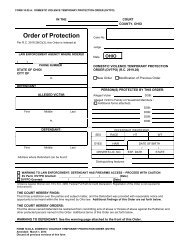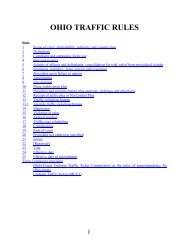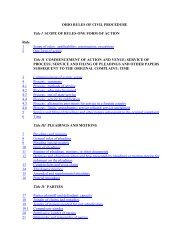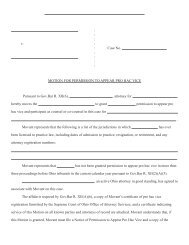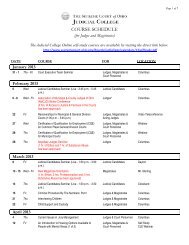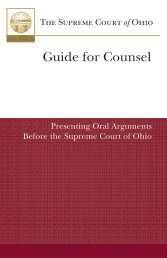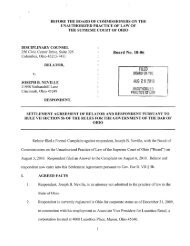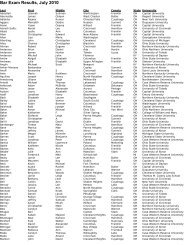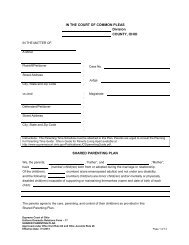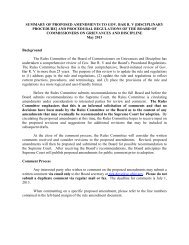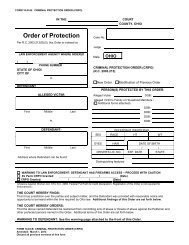disciplinary handbook: volume v - Supreme Court - State of Ohio
disciplinary handbook: volume v - Supreme Court - State of Ohio
disciplinary handbook: volume v - Supreme Court - State of Ohio
Create successful ePaper yourself
Turn your PDF publications into a flip-book with our unique Google optimized e-Paper software.
Kizer, Columbus Bar Assn. v.123 <strong>Ohio</strong> St.3d 188, 2009-<strong>Ohio</strong>-4763. Decided 9/17/2009.Case Summaries- 162Respondent neglected several legal matters to the prejudice <strong>of</strong> the clients‘ interests, accepted retainers thatshe did not deposit into a trust account, received fees for work she did not perform, and failed to returnthose unearned fees. Respondent was admitted to the <strong>Ohio</strong> bar in 2001, but registered inactive inSeptember 2008. She graduated from law school in 2000 but did not begin practice until 2003. Inaddition to the pressure <strong>of</strong> being a young sole practitioner, she had a number <strong>of</strong> serious stress factors inher personal life. She used her home as her <strong>of</strong>fice as a cost saving measure. By early 2007, she hadeffectively abandoned her practice by failing to return telephone calls, check e-mail messages, retrievemail, or attend court appearances. Relator tried unsuccessfully to serve grievances that it had receivedfrom three former clients in June, July, and August 2007, but respondent no longer had an <strong>of</strong>fice orreceived mail at the address she had registered with the court. In late August 2007, when respondentbecame aware <strong>of</strong> the grievances, she contacted OLAP. She met with relator‘s counsel in September 2007,but did not respond to the grievances in writing. She submitted an untimely written response to a fourthgrievance. Relator deposed respondent in March 2008. Respondent was assessed by OLAP anddiagnosed with drug and alcohol dependencies and mental disorders, but respondent abandoned herOLAP contract after 11 days citing a personality clash with an OLAP employee and her discomfortwith OLAP‘s emphasis on chemical dependency, which she did not believe was her problem. InOctober 2007, respondent sought mental-health treatment without OLAP‘s supervision. Her initialassessment was by NetCare Access and she began to see a counselor. She had a brief hospitalization forpsychiatric care and continued to receive outpatient psychiatric care. A letter from her treatingpsychiatrist stated that her diagnosis is major depression recurrent severe with no psychosis and that shewas under treatment and her symptoms are under control. The psychiatrist opined that she will beable to return to work as a lawyer and practice ethically, competently, and pr<strong>of</strong>essionally. Boardadopted the panel‘s findings, conclusions, and recommendations. As to Count I, the Board foundviolations <strong>of</strong> Pr<strong>of</strong>.Cond.R. 1.1, 1.3, 1.4(a)(3), 8.4(h) for her conduct in representing a client in a childcustodyand dependency matters wherein she did not deposit the retainer in a trust account, she filed amotion for allocation <strong>of</strong> a dependency exemption but failed to notify the client <strong>of</strong> the hearing in thematter, and respondent failed to appear at the hearing. She abandoned her <strong>of</strong>fice and left no forwardingaddress, thus, the respondent was unable to locate respondent. After the client filed the grievance,respondent secured a hearing date for the child custody matter, but failed to appear and the matter wasdismissed by the magistrate. Respondent obtained reinstatement <strong>of</strong> the case, but the client haddifficulty contacting her and got new counsel. Respondent‘s conduct caused the client delay andexpense. As to Count II, the Board found violations <strong>of</strong> Pr<strong>of</strong>.Cond.R. 1.1, 1.3, 1.4(a)(3), 8.4(h) foraccepting a retainer for representation in a visitation matter and then failing to file documentation toestablish paternity and failing to appear at a hearing. The client and his new attorney could not reachrespondent who has not returned the filed or the fees. Her misconduct substantially delayed the clientsecuring visitation. As to Count III, the Board found violations <strong>of</strong> Pr<strong>of</strong>.Cond.R. 1.1, 1.3, 1.4(a)(3), 1.15(d), 8.4(h) for failing to appear at a hearing after accepting a retainer and filing a motion to modifyparental rights. The client never heard from respondent again and did not receive a refund <strong>of</strong> theunearned retainer. The client was granted a pro se motion to obtain new counsel, but suffered delayand economic loss because <strong>of</strong> respondent‘s inaction. As to Count IV, the Board found violations <strong>of</strong>Pr<strong>of</strong>.Cond.R. 1.1, 1.3, 1.4(a)(3), 1.15(c) and (d), 8.4(h), and DR 9-102(A)(2) for failing to deposit aretainer for divorce representation into a trust account and after making several court appearance, theclient was unable to reach her so the client hired new counsel. She represented that she would send theclient a statement and any balance due but she did not. In aggravation, there was a pattern <strong>of</strong>misconduct and multiple violations that harmed some <strong>of</strong> her clients; she failed to honor the OLAPcontract; failed to fully cooperate in the investigation, although cooperative during later stages; and hasnot yet made restitution to the clients for her unearned fees. BCGD Proc.Reg. 10(B)(1)(c), (d), (e), (f).In mitigation, there is no prior discipline; there was cooperation <strong>of</strong> the hearing; there was remorse andacknowledgment <strong>of</strong> her duty to make restitution for unearned fees. BCGD Proc.Reg. 10(B)(2)(a), (b).



